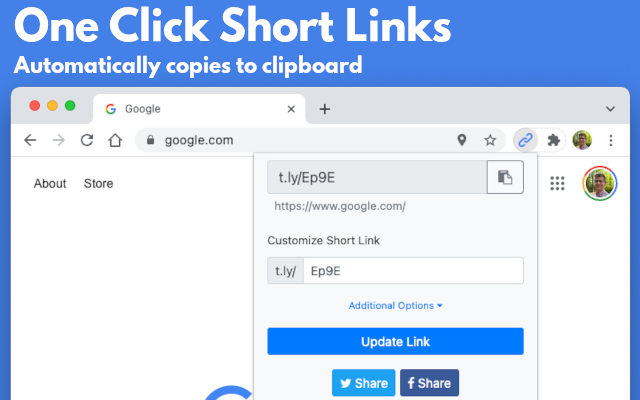
TinyURL vs Bitly: A Comprehensive Comparison of Features and History
When it comes to URL shortening services, marketers have long relied on the classic link-sharing services TinyURL and Bitly to get their URL management in tip-top shape. These services provide practical ways to turn long URLs into shorter, more manageable versions conducive to sharing across different platforms. A question that is often asked is, “Are URL Shorteners still useful today“? However, there has been some debate about which is better: TinyURL or Bitly? In this blog post, we’ll tackle this timely topic by taking a comprehensive look at both TinyURL and Bitly’s features, advantages, and disadvantages—including an exploration of how they got started—so you can decide for yourself which one is best for your marketing goals.
Introducing TinyURL and Bitly – A brief history of the two popular link shorteners
In the internet and social media age, shorter is always better when it comes to sharing links. This is where TinyURL and Bitly come into play, two of the oldest link-shortening services available today. TinyURL was launched way back in 2002 as a way for users to convert long, bulky URLs into manageable links. Similarly, Bitly followed suit and was established in 2008 with even more features, such as customized links and link tracking. Today, these two services are widely used by social media marketers, bloggers, and individuals to make their links more attractive and shareable. In this brief history, we’ll learn about these link shorteners’ beginnings and how their evolution has made them indispensable tools in the digital age.
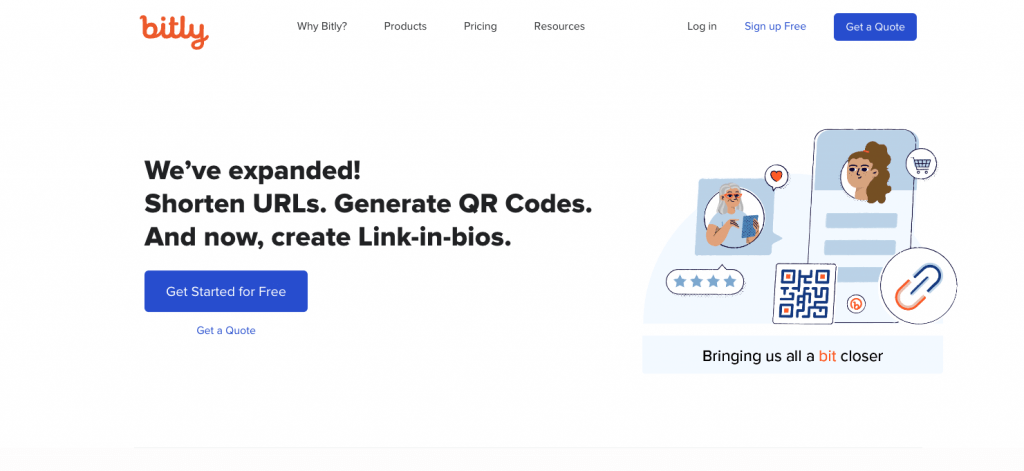
Are URL Shorteners Still Relevent Today?
Yes, URL shorteners are still relevant and necessary today. Although the proliferation of AI-based technologies and QR Codes make sharing and communication easier, URL shorteners remain an important part of web development for a variety of reasons. For starters, they are essential for managing long URLs and making them easier to share on social media platforms. Shortened URLs also allow businesses to track user engagement with their content, use branded domains, and customize links with UTM parameters in order to gain deeper insights into user behavior. Ultimately, URL shorteners offer a wide range of benefits that make them indispensable tools in our digital world.
Features Comparison – What makes each stand out from the other
When comparing different features, it’s essential to understand what sets each option apart from the others. Regarding product comparisons, taking a closer look at what each one offers can be beneficial. When comparing features, it’s essential to remember the user’s needs. Each product may excel in a different area, so understanding what you need as an individual can go a long way in helping you make the right choice. By taking a closer look at the various aspects of each option, you’ll be able to determine what features truly stand out from the rest. So, whether you’re in the market for a new car or a piece of software, make sure you’re taking the time to do your research and find the one that truly stands out for you.
TinyURL vs. Bitly Comparison
| Feature | TinyURL | Bitly |
|---|---|---|
| Custom Domains | Yes | Yes |
| Trackable Links | Yes | Yes |
| Free Plan | Yes | Yes |
| Link Management Tools | Yes | Yes |
| Link Shortening Length (Characters) | 28 | 22 |
| Integration with Social Media Platforms | Limited | Wide Range |
| History of Link Sharing | No | 30 days |
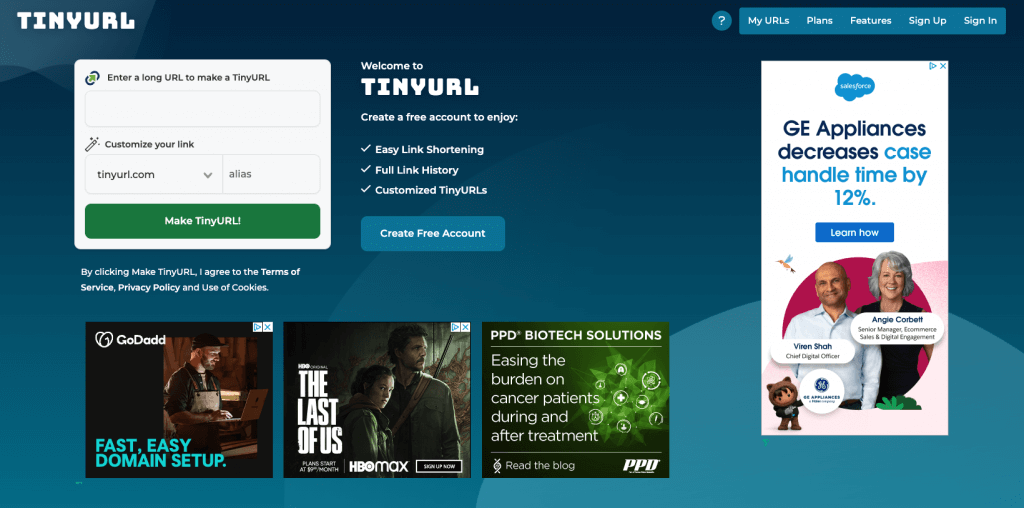
Security & Privacy – An in-depth look at how secure both services are
TinyURL offers some basic security features to protect users from malware and phishing scams. All TinyURL links are encrypted using HTTPS, which helps to secure user data and prevent unauthorized access. TinyURL does offer two-factor authentication.
Bitly takes security very seriously and offers a range of advanced security features to protect its users. In addition to HTTPS encryption, Bitly uses link scanning to check links for malware and phishing scams. The service also offers two-factor authentication to help prevent unauthorized access to user accounts.
In addition to these features, Bitly also has a dedicated security team that monitors the platform for any security threats or vulnerabilities. This team works closely with other security organizations and industry experts to ensure that Bitly remains secure and up-to-date with the latest security best practices.
Comparison of Security Features Here’s a comparison of the security features of TinyURL and Bitly:
| Security Feature | TinyURL | Bitly |
|---|---|---|
| HTTPS encryption | Yes | Yes |
| Link scanning | No | Yes |
| Two-factor authentication | Yes | Yes |
| Dedicated security team | No | Yes |
As you can see, Bitly offers a much more comprehensive set of security features than TinyURL. While TinyURL does offer HTTPS encryption to protect user data, Bitly goes above and beyond by offering link scanning and a dedicated security team to monitor the platform for any security threats.
If you’re concerned about security, Bitly is the clear winner when compared to TinyURL. With its advanced security features and dedicated security team, Bitly provides a much more secure platform for shortening and managing links. However, it’s important to note that both services are generally safe to use, and using HTTPS encryption is a basic but crucial security feature that both services provide.
Analytics & Insights – How to use data to track links more efficiently
When it comes to analytics and insights, Bitly is the clear winner over TinyURL. Bitly provides detailed analytics on each link, including the number of clicks, referrers, and geographic location of users. This information can be used to track the effectiveness of marketing campaigns, understand user behavior, and identify trends. Bitly also offers custom dashboards, which allow users to create and save custom reports on link performance. In contrast, TinyURL does not offer any analytics or insights beyond basic click tracking. While TinyURL may be sufficient for users who only need to shorten links, businesses and marketers who need more detailed insights will find Bitly’s advanced analytics and reporting features invaluable.
Pricing Plans – Analyzing the different pricing options available for each service
When it comes to pricing, both TinyURL and Bitly offer free and paid plans. TinyURL is completely free to use, with no limits on the number of links that can be shortened. They recently started offering paid monthly plans from $9.99 to $199. In contrast, Bitly offers a free plan with some basic features but limits the number of links that can be shortened to 10 per month. Beyond this limit, users must upgrade to one of Bitly’s paid plans. Bitly’s paid plans offer a range of advanced features, including custom domains, advanced analytics, and team collaboration tools. The pricing for Bitly’s paid plans ranges from $8 to $199 per month, depending on the required features and level of service. Overall, while TinyURL is a good option for users who only need to shorten links, businesses and marketers who need advanced features and analytics may find Bitly’s paid plans to be worth the investment.
TinyURL Pricing Page
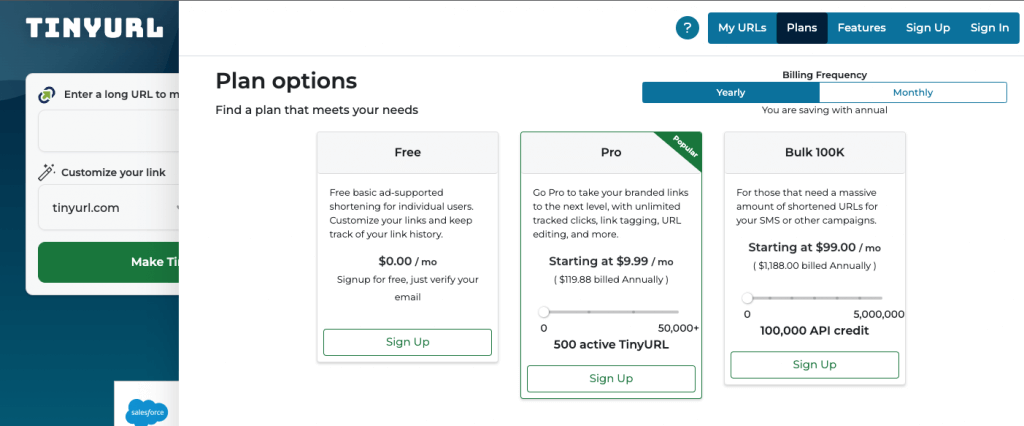
Bitly Pricing Page
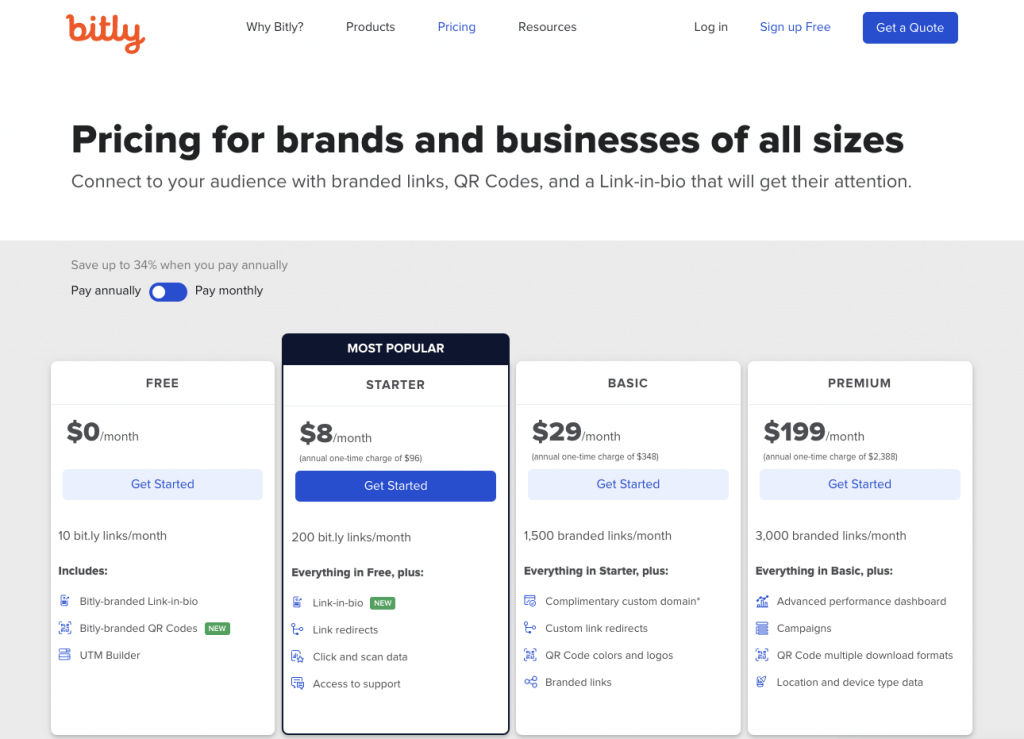
User Interface Comparison – Evaluating user experience on both platforms
Both TinyURL and Bitly offer clean and user-friendly interfaces that are easy to navigate. TinyURL has a simple and straightforward interface with an ad-supported minimalistic design that focuses on the basic function of shortening links. The website is easy to use but lacks some of the more advanced features offered by Bitly. Bitly’s interface is more robust, with more features and options available to users. Despite this, the interface remains intuitive and easy to navigate, with a modern design that looks great on both desktop and mobile devices. Overall, both TinyURL and Bitly offer good user interfaces, but Bitly’s more advanced features and options give it an edge for users who need a more comprehensive link management platform.
With TinyURL and Bitly being two of the most widely-used link shorteners, it’s no surprise that they offer great features to help make your links shareable and secure. TinyURL is a great choice for anyone wanting a free, simple way to shorten links, while Bitly caters more to professionals and businesses who require advanced features. However, at the end of the day, which one you choose depends on your needs and what you want from a link-shortening service. Both TinyURL and Bitly have their pros and cons – but with our analysis, we believe that you can decide which link shortener is best for you after using both.
Related Posts
Tim Leland
Ready to improve how you manage links?
T.LY URL Shortener makes long links look cleaner and easier to share! Add your own Custom Domains to personalize your brand. Create Smart Links to customize a URL's destination. Generate QR codes to promote your business.
Sign Up for Free


